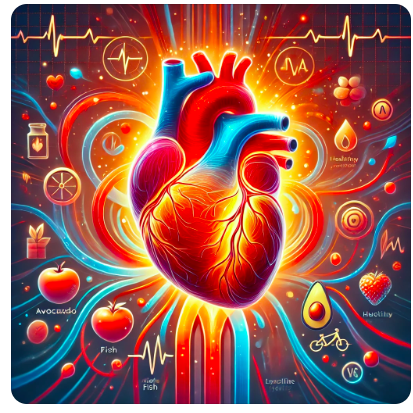 Would you like to have a stronger heart and cardiovascular system to live longer and to be there for your family and friends? Would you like to have a stronger heart and cardiovascular system to live longer and to be there for your family and friends?
You probably know already, but if you don’t cardiovascular disease is the #1 cause of death worldwide, responsible for nearly 1 in 3 deaths in the U.S. alone.
Many people don’t recognize the warning signs of heart disease or know their risk factors.
However, 80% of heart disease cases are preventable through lifestyle changes.
February is Heart Healthy month, so this is a great opportunity to focus on educating yourself.
Why is Cardiovascular Disease the #1 Cause of Death?
- Unhealthy diet and nutrition
- Lack of physical exercise and sedentary lifestyle
- High blood pressure (hypertension)
- High cholesterol and artery blockages
- Stress, anxiety and mental disorders
- Smoking and alcohol
- Obesity and diabetes
- Aging and genetic risks
- Poor sleep and lack of recovery
- Lack of awareness and preventative care
What are Natural Solutions for Cardiovascular Disease and Prevention?
 1. Optimize Your Diet for Heart Health 1. Optimize Your Diet for Heart Health
A heart-friendly diet reduces inflammation, lowers cholesterol, and stabilizes blood pressure.
Best Foods for Heart Health:
- Leafy Greens – Spinach, kale, and collard greens are rich in nitrates and antioxidants that improve circulation and lower blood pressure.
- Fatty Fish – Salmon, mackerel, and sardines provide omega-3 fatty acids, which lower triglycerides and reduce inflammation.
- Berries – Blueberries, strawberries, and raspberries are high in antioxidants that prevent arterial damage.
- Nuts & Seeds – Almonds, walnuts, and flaxseeds contain healthy fats, fiber, and magnesium, reducing cholesterol levels.
- Whole Grains – Oats, quinoa, and brown rice improve cholesterol and blood sugar regulation.
- Olive Oil – Extra virgin olive oil is packed with polyphenols, which help fight inflammation.
- Dark Chocolate (85%+ Cocoa) – Rich in flavonoids that improve circulation and lower blood pressure.
Foods to Avoid or Limit:
- Processed & Fast Foods – High in trans fats, sodium, and preservatives that raise blood pressure and cholesterol.
- Sugary Drinks & Refined Carbs – Soda, white bread, and pastries spike blood sugar, increasing the risk of obesity and diabetes.
- Processed Meats – Linked to higher cholesterol and heart disease risk.
- Excess Alcohol – Increases blood pressure and promotes inflammation when consumed in large amounts.
 2. Exercise & Movement 2. Exercise & Movement
Staying active is one of the best ways to strengthen your heart and improve circulation.
Recommended Weekly Exercise:
- 150 minutes of moderate aerobic exercise (e.g., brisk walking, cycling, swimming) OR
- 75 minutes of high-intensity exercise (e.g., running, HIIT workouts)
- Strength Training (2-3x per week) – Builds muscle, reduces fat, and improves metabolism.
- Daily Movement – Aim for 10,000 steps/day to stay active.
Best Workouts for Heart Health:
- Brisk Walking (30 min/day)
- Swimming (Great for low-impact cardio)
- Cycling (Boosts heart endurance)
- Yoga (Reduces stress & lowers blood pressure)
- Jump Rope (Great HIIT workout)
3. Maintain a Healthy Weight
Being overweight, especially carrying belly fat (visceral fat), increases the risk of high blood pressure, diabetes, and cholesterol issues.
Steps to Maintain a Healthy Weight:
- Eat whole, nutrient-dense foods (avoid processed junk).
- Portion control – Avoid overeating; eat until 80% full.
- Stay active daily – Avoid prolonged sitting.
- Prioritize protein & fiber – Keeps you full and supports metabolism.
4. Manage Blood Pressure Naturally
High blood pressure (hypertension) is a silent killer and a major risk factor for stroke, heart attack, and kidney disease.
How to Lower Blood Pressure:
- Reduce Salt Intake – Aim for less than 2,300 mg/day (1 tsp).
- Eat Potassium-Rich Foods – Bananas, sweet potatoes, avocados, and beans balance sodium levels.
- Stay Hydrated – 8-10 cups of water/day flushes out excess sodium.
- Limit Alcohol & Caffeine – Too much spikes blood pressure.
- Practice Deep Breathing & Meditation – Lowers stress hormones that cause blood pressure spikes.
5. Balance Cholesterol Levels
High LDL (“bad”) cholesterol leads to plaque buildup in arteries, increasing heart disease risk.
Best Strategies for Cholesterol Control:
- Eat soluble fiber (oats, beans, flaxseeds) – Helps lower LDL cholesterol.
- Replace unhealthy fats with healthy fats (olive oil, nuts, avocado).
- Increase omega-3 intake – Lowers triglycerides & boosts HDL (“good”) cholesterol.
- Reduce sugar & refined carbs – Prevents fat accumulation in arteries.
 6. Reduce Stress & Prioritize Mental Health 6. Reduce Stress & Prioritize Mental Health
Chronic stress increases inflammation, raises blood pressure, and weakens immunity.
Ways to Manage Stress for Heart Health:
- Daily Deep Breathing – 5 minutes of box breathing (inhale 4 sec, hold 4 sec, exhale 4 sec, hold 4 sec).
- Meditation & Gratitude Practices – Shown to lower blood pressure & cortisol levels.
- Laughter & Social Connections – Boosts endorphins & reduces heart attack risk.
- Journaling & Expressing Emotions – Lowers emotional burden on the heart.
 7. Get Quality Sleep Every Night 7. Get Quality Sleep Every Night
Lack of sleep increases the risk of heart disease, obesity, and high blood pressure.
How to Improve Sleep:
- Stick to a consistent sleep schedule (7-9 hours).
- Avoid blue light/screens 1 hour before bed.
- Keep room cool, dark, and quiet.
- Limit caffeine after 2 PM.
- Practice relaxation techniques (herbal tea, reading, meditation).
8. Stay Hydrated
- Water prevents blood from thickening, reducing heart strain.
- Dehydration can lead to higher blood pressure and poor circulation.
- Tip: Drink half your body weight (lbs) in ounces of water per day. (Example: If you weigh 160 lbs → Drink 80 oz of water daily).
9. Quit Smoking & Limit Alcohol
- Smoking damages blood vessels, increases blood pressure, and reduces oxygen in the blood.
- Alcohol in excess can raise triglycerides and increase heart disease risk.
Best Strategies:
Quit smoking completely (Seek nicotine replacement therapy or support groups).
Limit alcohol to 1 drink/day (women) or 2 drinks/day (men).
10. Get Regular Health Check-Ups
Early detection is key to preventing heart disease.
Key Tests to Monitor:
- Blood Pressure – Should be <120/80 mmHg
- Cholesterol Panel – Check LDL, HDL, Triglycerides
- Blood Sugar (A1C Test) – To prevent diabetes
- Inflammation Markers (CRP Test) – High levels indicate heart disease risk
 Final Thoughts: Your Heart, Your Health, Your Choice. Final Thoughts: Your Heart, Your Health, Your Choice.
Preventing cardiovascular disease doesn’t require extreme changes—small, consistent actions make a huge impact.
Start Today:
- Pick ONE habit to focus on this week.
- Share your biggest takeaway in the comments!
|